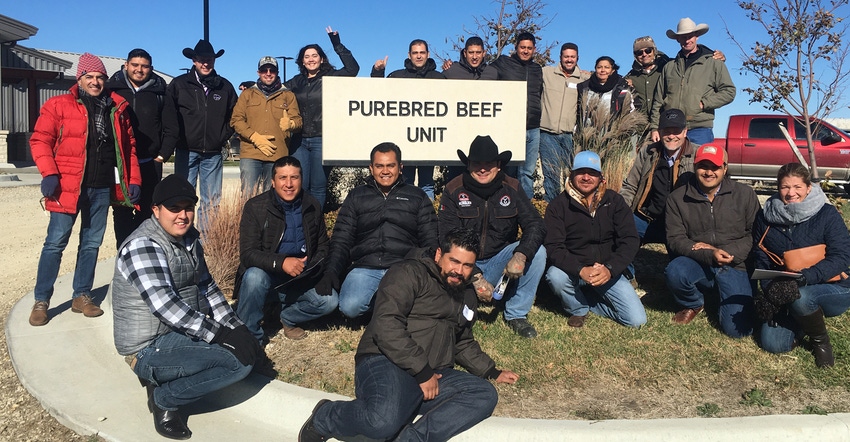November 11, 2019

The Beef Cattle Institute at Kansas State University and Bayer Animal Health teamed up recently to give 19 individuals from the cattle industry in Mexico special training and an inside look at beef cattle operations in Kansas
The group from Mexico was made up of veterinarians, cow-calf producers, feedlot managers and nutritionists. Their five-day training, conducted in late October, included on-site tours of local beef cattle operations and discussions with K-State beef production experts.
The training was offered as an opportunity to create a dialogue with veterinarians and producers from Mexico about U.S. beef production practices as well as some of the similarities and differences in their own production practices.
As part of the on-site tours, the group visited Tiffany Feeders near Herington, Porter Cattle Company near Reading, and K-State animal sciences and industry department facilities in Manhattan. Bob Weaber, professor of animal sciences and industry, was host of the university facilities tour.
To complement the operation visits, the group heard from Extension specialists, university faculty and a registered dietitian, and they engaged in several group discussions.
The importance of his customers knowing the whole chain of the beef industry led Eduardo Ramirez España, veterinarian and technical manager for Bayer Animal Health Mexico, to work with K-State's Brad
White, professor of production medicine and director of the Beef Cattle Institute; and Bob Larson, professor of production medicine, the Edgar E. and M. Elizabeth Coleman chairman of food animal medicine and a BCI faculty staff member, to facilitate the training.
"What I liked most about this training is that the professors are very open to sharing information with people," España said. "Some of our customers asked all kinds of questions and every time they got answered."
Alexandro Herrera Castro, a cow-calf producer and client of Bayer, found the training extremely valuable.
"It's been a great experience and we're always, always learning," he said. "I think that in this business we shouldn't have borders in our minds with information. We should be worldwide cattlemen, veterinarians and doctors, and that's the way these doctors made us feel. They open our minds to different options, different information, different solutions."
Because the group was from various areas of Mexico, not only were there differences in practices between the U.S. but among the group members as well.
"Even among this group from Mexico, they were not coming from the same environment, so they had some different production practices," Larson said. "I learned a lot just by listening to producers who are producing cattle in different environments and some of the challenges they have."
Castro said the impact of the training will be longstanding.
"I really think I'm going back to Mexico not only as a different cattleman but as a different person," he said. "For me, that is priceless."
Source: Kansas State University News Service, which is solely responsible for the information provided and is wholly owned by the source. Informa Business Media and all its subsidiaries are not responsible for any of the content contained in this information asset.
You May Also Like




